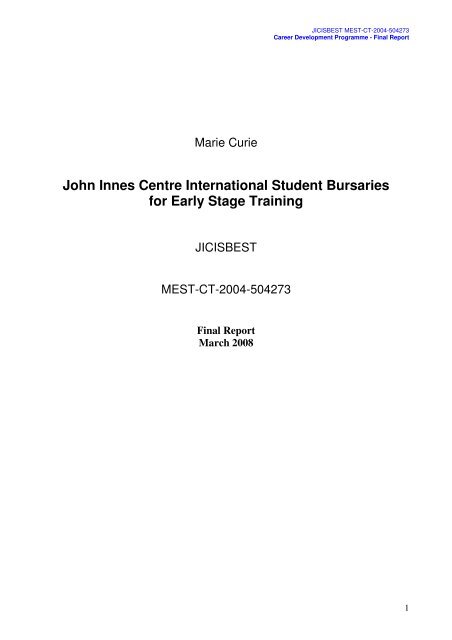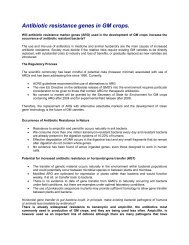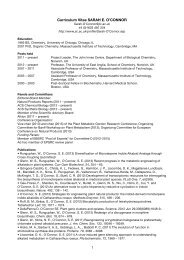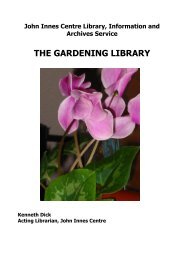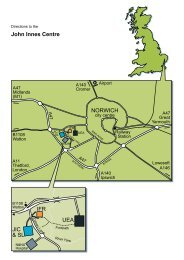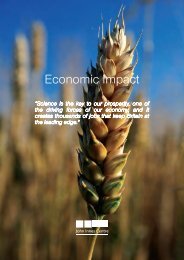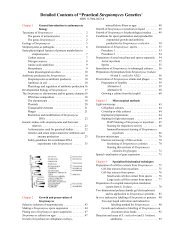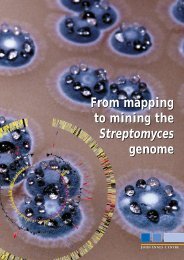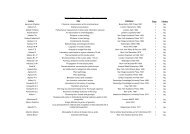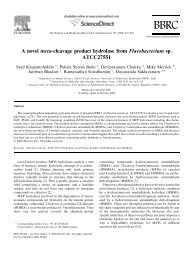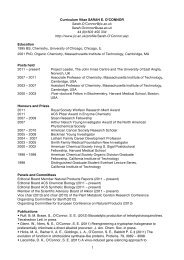here - John Innes Centre
here - John Innes Centre
here - John Innes Centre
You also want an ePaper? Increase the reach of your titles
YUMPU automatically turns print PDFs into web optimized ePapers that Google loves.
JICISBEST MEST-CT-2004-504273<br />
Career Development Programme - Final Report<br />
Marie Curie<br />
<strong>John</strong> <strong>Innes</strong> <strong>Centre</strong> International Student Bursaries<br />
for Early Stage Training<br />
JICISBEST<br />
MEST-CT-2004-504273<br />
Final Report<br />
March 2008<br />
1
JICISBEST MEST-CT-2004-504273<br />
Career Development Programme - Final Report<br />
SUMMARY<br />
1. Project Outline<br />
The contract ran from 1 st April 2004 to 31 st March 2008, providing research training in the field of plant<br />
molecular biology and microbiology (total 396 training months). The <strong>John</strong> <strong>Innes</strong> <strong>Centre</strong> served as a host<br />
mono-site for this multidisciplinary training programme. It was able to do this effectively because of its size,<br />
scope and international reputation as a high quality environment for research training. From the final reports<br />
of EST Fellows, 8 rated the quality of research training received as “Excellent”; 6 as “Very Good”; 1 as<br />
“Satisfactory”; and none as “unsatisfactory”.<br />
2. Scientific Highlights<br />
The main research objectives associated with the EST programme were: - to discover basic biological<br />
processes in plants and microorganisms; to develop and apply the platform technologies that underpin<br />
modern molecular biology, and to create plants and bacteria of enhanced value. Research undertaken by EST<br />
Fellows has led to important discoveries in the fields of plant breeding, developmental biology and<br />
biotechnology. For all EST Fellows, a combination of taught courses and a wide range of research seminars<br />
provided opportunities for a broad-based scientific and technical training. This was supported by an<br />
extensive programme designed to enhance complementary professional skills. Some research training also<br />
involved links with industry, and the development of patents in the field of biotechnology.<br />
2. Outstanding Achievements<br />
High quality scientific research and science communication was recognized in many instances: -<br />
• Three national science communication awards;<br />
• Four invitations to speak at international meetings;<br />
• Eight awards for best posters at national/ international/ local meetings;<br />
• Five short-term visits to international laboratories;<br />
• Four international postdoctoral research fellowships awarded (with more applications currently<br />
being prepared).<br />
3. Economic and Social Impact of the Project<br />
This programme has provided an excellent training environment and a springboard for careers in academic or<br />
industrial research. All EST Fellows have received extensive training in research methods, thus contributing<br />
to an enhancement of knowledge and skills in the labour pool in the European Research Area. Fourteen EST<br />
Fellows have progressed towards PhD degrees; and one took a Masters-level degree in computational<br />
biology before progressing to an MBA.<br />
As a result of research conducted under this training contract, t<strong>here</strong> have been important scientific advances<br />
some of which will lead directly to commercial application. T<strong>here</strong> has been a significant advance in the<br />
understanding of chromosome pairing in meiosis which could have applications in the development of<br />
strategies for plant breeding, for example of hexaploid wheat. One patent has been filed that describes a high<br />
level expression system for production of introduced proteins in plant tissues from plant virus vectors. T<strong>here</strong><br />
have also been major advances in the use of plant viruses as agents for nano-technology: this has a wide<br />
range of potential applications in therapeutic medicine, electronics, materials science and bioinorganinc<br />
chemistry.<br />
4. Dissemination of Knowledge<br />
Research has already led to 20 publications in high quality refereed journals with many more manuscripts in<br />
preparation. EST Fellows have attended over 30 international conferences and workshops: in the majority of<br />
cases they were active (rather than passive) participants. EST Fellows have also taken an active role in the<br />
communication of science to schools and to the general public, for example through the meeting of the<br />
British Association for the Advancement of Science (Norwich, 2006).<br />
5. Equal Opportunities<br />
Fifteen EST Fellows were recruited from nine countries: The gender balance (M:F) was 7:8.<br />
SCIENTIFIC AND TECHNICAL HIGHLIGHTS<br />
2
JICISBEST MEST-CT-2004-504273<br />
Career Development Programme - Final Report<br />
The <strong>John</strong> <strong>Innes</strong> <strong>Centre</strong> (and the associated Sainsbury Laboratory) is acknowledged internationally as one of<br />
the premier institutes for fundamental and strategic studies of plant and microbial sciences. JIC is a very<br />
open scientific environment in which knowledge and skills are freely shared. This means that EST Fellows<br />
have been exposed to a truly interdisciplinary research environment, including specialities ranging from bioinorganic<br />
chemistry, biochemistry, cell biology and molecular biology, through to genetics, plant and<br />
microbial physiology and whole plant studies in the field. Through their Early Stage Training, Fellows have<br />
made significant contributions to research and development in the following fields:-<br />
Biological Chemistry: Fellows were trained in the molecular understanding and engineering of key plant<br />
and microbial processes, leading to the delivery of improved biological properties and new materials. Using<br />
Cowpea Mosaic Virus (CPMV) as a model system, Nicole Steinmetz undertook a project on viral capsids as<br />
programmable nanobuilding blocks with a variety of applications in medicine and nonotechnology.<br />
Cell and Developmental Biology: EST Fellows undertook research to determine the function of genes in<br />
model plant species such as Arabidopsis and Antirrhinum. Research exploits genome sequences and other<br />
information-intensive activities. Veronika Mikitova analysed molecular components interacting with CDK-A<br />
in the control of the cell cycle in plants, while Christian Breuer investigated BIN4, a novel component of the<br />
plant DNA topoisomerase VI complex. Sonia Bosca carried out the positional cloning of Mur9, a gene that<br />
affects the assembly of plant cell walls. Ulises Rosas investigated the evolution of organ shape and size using<br />
floral asymmetry in Antirrhinum as a model system for genetic analysis.<br />
Computational Biology: Several EST Fellows undertook short training projects in the Computational<br />
Biology Group which provides an underpinning framework for computational biology and bioinformatics at<br />
JIC/SL. Meifang XU developed a computational model for a plant extracellular matrix glycoprotein involved<br />
in the interaction of symbiotic Rhizobium bacteria with their legume hosts<br />
Crop Genetics: EST Fellows received training in fundamental research on the biology of cereals, brassicas<br />
and legumes to understand the genetic and molecular basis of phenotypic variation. Isabelle Colas used<br />
genetic and cytological techniques to study the mechanisms of meiosis in wheat and Violaine Pinon<br />
characterised PIGGYBACK1, a gene that encodes a ribosomal protein that is apparently involved in leaf<br />
development and morphogenesis.<br />
Gene silencing: Tomasz Poprawka investigated the roles of small RNAs in the control of transition steps<br />
during plant shoot apex development. Linfeng Huang studied the biochemistry of RNA polymerase IV in<br />
gene silencing in plants and Susi Heimstaedt undertook a functional analysis of Arabidopsis Argonaute<br />
proteins.<br />
Metabolic Biology: Fellows were involved in research on fundamental aspects of plant metabolism, on the<br />
nutritional and industrial application of plant products and on the development of plant 'factories' for<br />
valuable materials. Carle Cle undertook a research project based on the detection of glycan synthesis and<br />
polymer initiation on surfaces which provides a model for activities on the surface of starch granules in<br />
plants. Frank Sainsbury developed new ways for enhancing expression and accumulation of therapeutic<br />
proteins in plants using the CPMV vector.<br />
Molecular Microbiology: Genome sequences, functional genomics technology and developments in<br />
bioinformatics have given a new thrust to molecular microbiology and these opportunities were fully<br />
explointed by EST Fellows. Alexandre DeCorps studied membrane targeting of the E. coli ammonium<br />
channel protein AmtB which involves a cleavable N-terminal signal peptide in the inner membrane protein.<br />
Stefan Mann investigated the importance of the Tat protein secretion pathway in the virulence of the plant<br />
pathogen Streptomyces scabie.<br />
Research Highlights<br />
Five high-profile research publications are listed below: -<br />
1. Isabelle Colas demonstrated that effective chromosome pairing requires chromatin remodelling at the<br />
onset of meiosis (PNAS, 2008 105: 6075-6080);<br />
2. Violaine Pinon demonstrated that three PIGGYBACK genes that specifically influence leaf patterning<br />
encode ribosomal proteins (Development, 2008 135, 1315-1324);<br />
3. Christian Breuer showed that BIN4, a novel component of the plant DNA Topoisomerase VI complex,<br />
is required for endoreduplication in Arabidopsis (Plant Cell, 2007 19: 3655-68)<br />
3
JICISBEST MEST-CT-2004-504273<br />
Career Development Programme - Final Report<br />
4. Nicole Steinmetz developed a method for the assembly of multilayer arrays of viral nanoparticles via<br />
biospecific recognition: (Biomacromolecules, 2008 9, 456–462).<br />
5. Frank Sainsbury developed methods for expression of multiple proteins using full-length and deleted<br />
versions of cowpea mosaic virus RNA-2 (Plant Biotechnology Journal, 2008 6, 82-92).<br />
RESEARCH TRAINING ACTIVITIES<br />
FINAL REPORTS FROM EST FELLOWS<br />
From the final reports of EST Fellows, 8 rated the quality of research training received at JIC as “Excellent”;<br />
6 as “Very Good”; 1 as “satisfactory; and none as unsatisfactory.<br />
Some examples of comments from EST Fellows are set out below:-<br />
1. I really enjoyed my time at the <strong>John</strong> <strong>Innes</strong> <strong>Centre</strong>. It is a fantastic place to do research, with lots of<br />
additional training opportunities.<br />
2. The <strong>John</strong> <strong>Innes</strong> <strong>Centre</strong> provides a great place for interactions with scientists in other research areas.<br />
This became very useful for technical advice and sharing resources for my research work.<br />
3. During the training, I was planning and managing my own experiments. I have also successfully had<br />
experience in writing my own grant applications during my third year to secure independent funding<br />
after completion of my PhD.<br />
4. From daily lab work I learned basic laboratory skills, especially in molecular biology and plant<br />
biochemistry. I also learned advanced bioinformatics knowledge especially in protein modelling and<br />
attended an advanced course on epigenetics.<br />
5. Twice a year, I presented my results and future objectives to a lab meeting using powerpoint<br />
presentations. I also presented posters at national and international conferences.<br />
6. I have increased my management skills; I have demonstrated that I can plan my work and meet<br />
deadlines. I am currently writing proposals and fellowship applications.<br />
7. A 4-week research visit to a lab in Amsterdam allowed me to get interesting experience both on<br />
techniques and ideas from a very influential lab in my area of interest.<br />
8. Attending international conferences helped me to establish productive collaborations and put me in<br />
touch with scientists in my field from around the world.<br />
9. I have communicated with the press through articles about my work in local and national media.<br />
Furthermore, I have given talks at two British schools, explaining to school children what<br />
biotechnology is.<br />
10. Taking part in the Biotech YES scheme was a great chance to make use of the transferable skills that<br />
I had learned through the programme of professional skills training.<br />
11. JIC exposes the students to a huge range of research possibilities. Ambitions are always kept high so<br />
students know what they should be aiming for.<br />
12. The facilities at JIC are remarkable and I never suffered any delays due to a lack of resources.<br />
RESEARCH EXPERIENCE:<br />
For each EST Fellow, a supervised research project served as the vehicle for an intensive training in research<br />
techniques and gave practical experience of how to develop strategies for scientific analysis and how to<br />
design and execute experiments to pursue a meaningful line of enquiry. Fellows also attended and participate<br />
in a wide range of seminar programmes designed to improve their knowledge of the research field and<br />
develop their skills in science communication.<br />
Supervisory Committees and Personal Career Development Planning: Within the first two weeks of<br />
arrival, the Fellow’s supervisor established a Supervisory Committee (comprising the supervisor plus at least<br />
two other academic staff). This Committee met periodically to discuss the Fellow’s research objectives and<br />
individual training needs, both technical and generic. These meetings normally followed the submission of<br />
written or oral research progress reports by the Fellow.<br />
LECTURES AND SEMINARS<br />
Experience gained through the Fellows’ own research project was complemented by the development of a<br />
deeper understanding of contemporary developments in plant and microbial sciences. This was made<br />
4
JICISBEST MEST-CT-2004-504273<br />
Career Development Programme - Final Report<br />
possible through the rich training environment provided by JIC. All Fellows engaged in a wide variety of<br />
scientific interactions, ranging from student contributions to research group and departmental seminars, to an<br />
Annual JIC Science Meeting (at which Fellows each present a poster); to the weekly high-profile JIC<br />
seminar with top-class speakers from anyw<strong>here</strong> in the world. EST Fellows and other PhD students at JIC<br />
also organised their own programme of monthly seminars: these are focussed on the general theme “Science<br />
in Society” with a wide range of outside speakers on contemporary science issues and career opportunities.<br />
Training in Research Techniques: EST Fellows attended courses that provided an introduction to a wide<br />
range of basic research methods and techniques used at JIC. In many cases they also attended specialist<br />
courses/ workshops at other institutions in Europe order to acquire specialist technical training. Fellows had<br />
access to a wide range of courses introducing advanced research techniques in molecular biology and<br />
biological chemistry. They selected their courses individually, following discussion with their Supervisory<br />
Panel. Fellows also attended specialist modules on statistical analysis, IT systems and information handling.<br />
Wider Scientific Horizons: EST Funding was available to enable Fellows to attend at least one major<br />
international conference. These opportunities were highly valued by the Fellows themselves. In addition,<br />
several Fellows visited different laboratories for a few weeks/months in order to develop their independence<br />
in a different laboratory environment. In many cases, research undertaken by Fellows at JIC formed part of<br />
broad-based international networks.<br />
PROFESSIONAL TRAINING<br />
Complementary (Professional) Skills: All EST Fellows attended a training programme to enhance the<br />
professional skills of researchers. The programme covered all aspects of the training template for early-stage<br />
researchers provided by the UK Research Councils. Modules in the first year covered aspects of the research<br />
environment; teamwork; time management and action planning; communication; professional writing;<br />
personal and interpersonal skills; presentation skills; IT and information handling; statistics and experimental<br />
design; career development; science and ethics in the 21 st century. In the second year, Fellows were<br />
encouraged to put their professional skills into practice and to improve their performance using the technique<br />
of “reflective learning”. The final modules (relating to preparation of the PhD thesis and long term issues of<br />
career development) were retained for the final year. As part of their “Science in Society” seminar series, JIC<br />
students organized occasional “alumni” events to explore the range of career opportunities available at the<br />
postdoctoral stage.<br />
Science in a Commercial Environment: All Fellows on the EST programme gained some exposure to the<br />
entrepreneurial environment through seminars and visits from representatives of large and small commercial<br />
institutions engaged in relevant scientific research. On the JIC site itself, t<strong>here</strong> is Plant Bioscience Ltd., a<br />
technology transfer company that deals with intellectual property from JIC and elsew<strong>here</strong>. T<strong>here</strong> is also a<br />
Bio-incubator that houses up to six start-up companies involved in the commercialisation of ideas and<br />
technologies arising from JIC and elsew<strong>here</strong>. These two groups combined to present an interesting 1-day<br />
seminar on intellectual property and entrepreneurship entitled “making money from science”. In addition,<br />
several Fellows have attended the BBSRC Biotechnology Young Enterprise Scheme, which is intended to<br />
raise awareness of the excitement and challenges associated with the commercialisation of research. The<br />
competition is run as a weekend workshop for teams of young bioscientists. Participants were given insights<br />
into business and commercialisation processes from those who have already established Biotech start-ups.<br />
The culmination of the competition is the preparation and presentation by each team of a hypothetical<br />
business plan for a new start-up company. ( http://www.biotechnologyyes.co.uk ).<br />
Links with Schools: Many EST Fellows engaged with local schools and scholars, either by hosting scholars<br />
at JIC over a 4-week period or through visits to an affiliated school in the vicinity of JIC. Contacts between<br />
EST Fellows and schools have served to develop the communication and teaching skills of EST Fellows as<br />
well as providing an excellent service to science in the community.<br />
Opportunities for University Teaching: All EST Fellows had the chance to teach in undergraduate practical classes at<br />
the University of East Anglia (Schools of Biology and Chemistry). EST Fellows will also had the opportunity to attend<br />
a University-based training course on “Teaching Skills”. Free English lessons were also available if required.<br />
5


